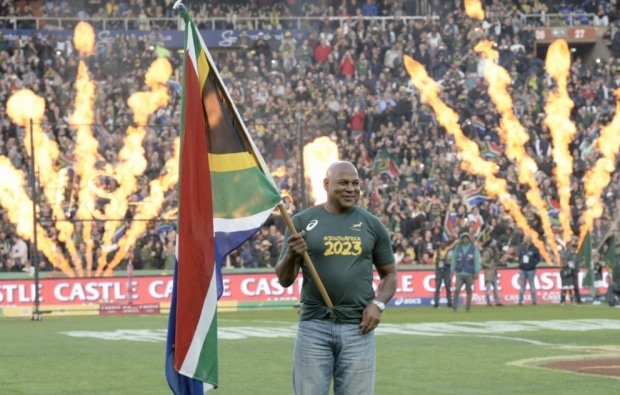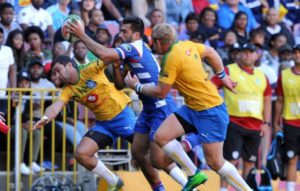A successful 2023 World Cup bid would force SA Rugby to address its structural flaws and ultimately boost the Springboks’ performance over the next six years, writes JON CARDINELLI.
It’s an open secret that the 2011 World Cup in New Zealand did not live up to financial expectations. It’s an open secret that World Rugby wanted the next tournament to be staged in the United Kingdom or Europe.
The powers that be certainly got what they wanted. The 2015 World Cup in England proved to be the greatest commercial success in the history of the tournament.
Already there are fears that the 2019 World Cup in Japan will fail to surpass, or even meet, the standards set by the 2015 tournament. As a result, the 2023 tournament will need to be staged in a country that can guarantee a substantial financial return.
SA Rugby believes that it can deliver that return. What’s more, CEO Jurie Roux and president Mark Alexander believe that South Africa’s technical bid is superior to that of France and Ireland.
Representatives from the three unions will present their respective cases to the World Rugby council in London on Monday. The 2023 World Cup bid winner will be announced on 15 November.
ALSO READ: World Rugby considers ‘preferred bidder’
South African fans of the 15-man game haven’t had a reason to cheer for the better part of a decade. It’s been eight years since the Boks won the Tri-Nations. It’s been seven since a South African side won the Super Rugby tournament.
That could change if SA Rugby wins the right to host the 2023 World Cup. Already there are plans to improve the structures in this country. There’s every chance that those plans will receive a boost in the lead-up to a global tournament on home soil.
England suffered the ultimate embarrassment when they bowed out of their home World Cup before the knockout stage. Japan, who are currently ranked 11th in the world, could suffer the same fate when they host the tournament in 2019.
Would the Boks, in their current guise, fare any better? There’s every reason to doubt them. Some jokers might say there are as many as 57 reasons, given the recent embarrassment in Albany.
Will this Bok side progress to the quarter-finals of the 2019 World Cup? They have been drawn in the same pool as Italy and New Zealand. They lost to Italy in Florence last year. They’ve lost 10 of their last 11 clashes against the All Blacks. It’s wouldn’t come as a complete surprise if this team failed to make the playoffs of that tournament.
That structural changes are needed is not up for debate. Something needs to be done at all levels of the game to ensure that the players arrive at the highest level with the necessary skills and conditioning to succeed.
Rassie Erasmus will assume the role of director of rugby at the start of the 2018 season. Regardless of the decision on 15 November, Erasmus will be tasked with ‘fixing’ South African rugby and ultimately boosting the Boks’ performances and results.
A successful World Cup bid, however, could result in a greater investment in SA Rugby and the Boks. That could help Erasmus’s cause.
We may see the South African teams improving in the respective tournaments at home and abroad over the next six years. Come 2023, South Africa may be in a position to field a national team that is capable of winning the World Cup and reliving the 1995 dream.
The current Bok side cannot be spoken about as World Cup contenders. The South African Super Rugby teams continue to struggle against New Zealand sides. The Boks suffered several record defeats in 2016.
More recently, the Boks lost 57-0 to an All Blacks side that was missing several of its first-choice players. That beating highlighted the South African players’ physical and mental shortcomings, as former Bok coach Nick Mallett and many others opined afterwards.
Player management has long been an issue in this country. New Zealand are ranked No 1 in the world at present, while England are No 2. Both boast central-contracting systems and both have some control over how the game is coached at the lower levels. The national side comes first.
In South Africa, however, the franchises and unions protect their own interests. The tail wags the dog.
A few Bok players were released to play for their respective Currie Cup teams this past weekend. Blue Bulls coach John Mitchell, however, exercised his right to manage the team as he saw fit. Mitchell did not include returning Bok halftbacks Rudy Paige and Handré Pollard. The latter was eventually included after Manie Libbok withdrew from the matchday squad with an injury.
Paige and Pollard were in dire need of game time. In a parallel universe where the South African set-up mirrored that of other professional organisations around the world, Paige and Pollard would have started for the Bulls. It wouldn’t have been a point of debate either. The interests of the national side would have been prioritised over the interests of any individual union.
SA Rugby must view the lead-up to the 2023 World Cup as an opportunity. If its bid proves successful, SA Rugby must put the necessary structures into place. An overhaul of the current system will be non-negotiable.
These changes should be made regardless of the decision on 15 November. That said, a successful World Cup bid may accelerate the process.
Nobody in South Africa will want the Boks to lose 57-0 to New Zealand and 37-21 to England (as was the case in 2016) in front of a global audience. Nobody will want to see the Boks becoming the third team – after England and in all likelihood Japan – to fall short of playoff qualification in their home World Cup.
Photo: Lee Warren/Gallo Images





